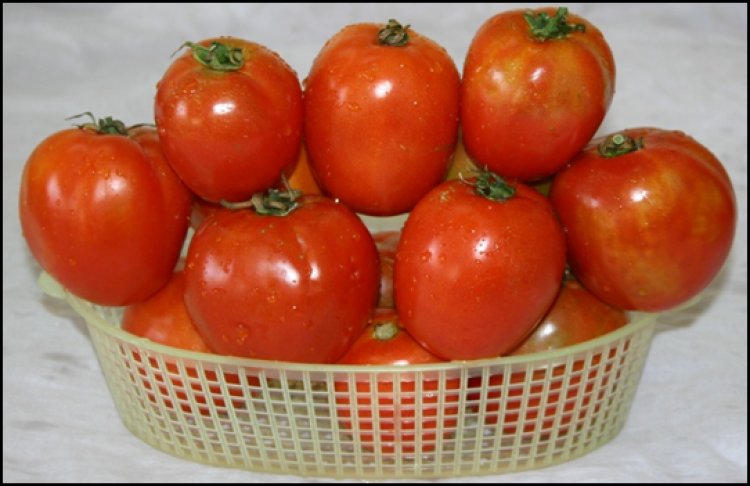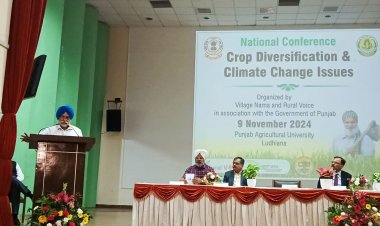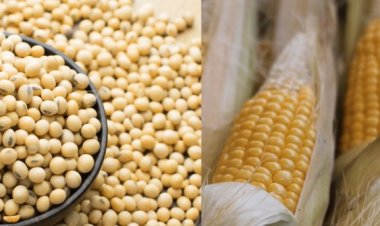The way fruits ripen: Role of genes
In the collaborative research, a team of plant scientists jointly led by Dr Rahul Kumar, University of Hyderabad, and Prof. Arun K Sharma, University of Delhi (DU), has characterized a yet-to-be-described ripening-induced ERF gene, SlERF.D7, for its roles in the regulation of fruit-ripening traits in tomato. The team developed both overexpression and gene-silenced lines of SlERF.D7.

Most of us want the vegetables or fruits to look fresh, colourful and healthy on our dining table. Often, the advertisements of cuisine/food look mouth-watering because of these traits.
But how does one ensure that the vegetables are fresh and tasty or fruits are ripe and of the right colour? Farmers do their best in the fields. Now, scientists are using their knowledge of genetics to reach consumer expectations.
It’s now quite established that genes play a key role in giving many traits of plants during the process of growing, flowering and fruit-bearing. The right genes also ensure that the plant variety gives a higher yield, and is resistant to insects and tolerant to drought, etc.
Now, if you want the fruits to ripen well, and have the right flavour and nice pigmentation (colour), all that you need is a good understanding of the genes responsible for these and develop biotechnology methods to achieve them.
Researchers at the University of Hyderabad (UoH) and the University of Delhi (DU) have identified both the genes and the mechanism of action that can potentially lead to producing fruits of the correct ripening and having a longer shelf life in the case of tomatoes.
Background
The role of ethylene in inducing ripening in fleshy fruits is well known. Due to the essential nature of ethylene in ripening, its biosynthesis and signalling pathways are well-studied in fleshy fruits such as tomatoes.
Several ripening-induced ethylene response factor (ERF) genes, the most downstream regulators of the ethylene-signalling pathway, have been identified as the key regulators of the fruit-ripening programme in fleshy fruits. However, a complete understanding of the genetic regulatory mechanisms underlying the ethylene-induced ripening programme remains to be fully understood.
Scientists have been focusing on understanding the molecular regulatory events to develop effective biotechnological strategies for improving ripening traits such as fruit flavour, pigment accumulation, and fruit shelf-life.
Plant varieties with prolonged fruit shelf-life can minimize the post-harvest loss of fruits and vegetables during transport and storage. Such superior varieties will also benefit farmers in getting a better return on investment and consumers in getting fresh and quality agri-products.
New findings
In the collaborative research, a team of plant scientists jointly led by Dr Rahul Kumar, UoH, and Prof. Arun K Sharma, DU, has characterized a yet-to-be-described ripening-induced ERF gene, SlERF.D7, for its roles in the regulation of fruit-ripening traits in tomato.
The team developed both overexpression and gene-silenced lines of SlERF.D7. The transgenic lines with SlERF.D7 overexpression produced more intense red fruits and accumulated higher lycopene levels than wild-type controls. In contrast, SlERF.D7 RNAi-silenced fruits showed less pigment accumulation but enhanced firmness than their same-age wild-type controls.

After demonstrating this, the researchers investigated the regulatory mechanism underlying the SlERF.D7 action. Overall, the study generated new knowledge on the molecular regulation of tomato fruit ripening and promises to help develop breeding strategies to improve ripening traits in fleshy fruits.
The collaborative research study by Priya Gambhir and colleagues Vijendra Singh, Adwaita Parida, Utkarsh Raghuvanshi and Arun Kumar Sharma of DU and Prof Rahul Kumar of UoH has been published in September 2022 (DOI: 10.1093/plphys/kiac441) in Plant Physiology, the scientific journal published by the American Society of Plant Biologists, USA.
Facilities at UoH
The Department of Biotechnology, Ministry of Science and Technology, has sanctioned Rs 6.18 crores for the period 2021-25 for the project titled “Research and Service facilities for Plant Metabolomics and Proteomics” to the Repository of Tomato Genomics Resources (RTGR) at the UoH.
The RTGR was established in 2010 to conduct advanced scientific research in the frontier areas of genomics, proteomics and metabolomics of tomatoes. The research and service at RTGR will be providing service to the UoH and other academic institutions, industry, seed companies, etc., on a charge basis.
The RTGR will also train the users to comprehend and execute metabolomic and proteomic data analysis by conducting annual hands-on training workshops. Dr Y. Sreelakshmi, Associate Professor at RTGR, will be coordinating the project. It will further research at the national level on the regulation of metabolic pathways and proteins underlying complex traits such as disease resistance and nutrition in crops.
(The writer is an independent journalist who specializes in Science & Technology, Agriculture, Business and start-ups and is based out of Hyderabad.)



 Join the RuralVoice whatsapp group
Join the RuralVoice whatsapp group








































